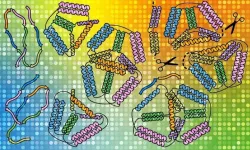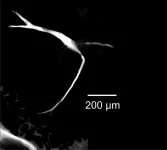INFORMATION:
The research was supported by the European Research Council and the National Natural Science Foundation of China.
The paper, "Varying demands for cognitive control reveals shared neural processes supporting semantic and episodic memory retrieval" is published in Nature Communications.
Study showing how the brain retrieves facts and may help people with memory problems
New study showing how the brain retrieves facts and personal experiences may help people with memory disorders
2021-04-12
(Press-News.org) A shared set of systems in the brain may play an important role in controlling the retrieval of facts and personal memories utilised in everyday life, new research shows.
Scientists from the University of York say their findings may have relevance to memory disorders, including dementia, where problems remembering relevant information can impact on the daily life of patients.
Researchers say the findings may also have important implications for the development of a new generation of artificial intelligence systems, which use long-term memory in solving computational problems.
The brain's long-term memory stores are categorised into two: factual memory and memory of personal experiences.
Together, these two long-term memory stores help us understand and respond to the world around us.
Decades of clinical and experimental research has shown that these two memory stores are represented across two separate brain regions.
But the new study suggests that a shared set of brain regions play an important role in controlling the successful retrieval of weak memories.
Using functional magnetic resonance imaging technology, researchers studied how these regions were shown to increase their activity when participants were asked to retrieve fact memories and personal memories.
Lead researcher Dr Deniz Vatansever, formerly of the University of York and now working for the Institute of Science and Technology for Brain-inspired Intelligence, Fudan University said: "The new research suggests that despite their functional differences, successfully retrieving weak information from these two memory systems might be dependent upon a shared brain mechanism.
"Our memories allow us to make sense and flexibly interact with the world around us. Although in most cases, our strongly encoded memories might be sufficient for the task at hand, remembering to pack a beach towel for an upcoming seaside holiday, this strong memory may be irrelevant in other instances, such as when packing for a business trip. As such, we need to tightly control the retrieval of relevant memories to solve different tasks under different circumstances. Our results indicate that this control process might be shared across both factual and personal memory types."
Senior author Prof. Elizabeth Jefferies from the Department of Psychology, University of York, said: "In order to generate appropriate thoughts and behaviours, we have to draw on our memory stores in a highly flexible way. This new study highlights control processes within the brain that allow us to focus on unusual aspects of the meanings of words and to retrieve weakly encoded personal experiences. This control over memory allows us to be creative and to adapt as our goals or circumstances change."
ELSE PRESS RELEASES FROM THIS DATE:
Is a calorie a calorie? Not always, when it comes to almonds
2021-04-12
Researchers at the University of Toronto have found that a calorie labelled is not the same as a calorie digested and absorbed, when the food source is almonds.
The findings should help alleviate concerns that almonds contribute to weight gain, which persist despite the widely recognized benefits of nuts as a plant-based source of protein, vitamins and minerals.
"Nuts have generally been thought of as healthy the last two decades, but the messaging around nuts has often come with a disclaimer that they are high in fat and energy," said John Sievenpiper, ...
World's first study to evaluate greenhouse gas emissions from Chinese inland waters
2021-04-12
Inland waters are an important component of the global carbon cycle and function as active reactors, transporting and transforming large quantities of naturally- and anthropogenically-derived carbon. Previous studies suggest that inland waters are major sources for greenhouse gas emissions to the atmosphere, yet these emissions are poorly constrained (Note 1).
As a primary greenhouse gas that drives global climate change, carbon dioxide (CO2) emissions from inland waters play a key role in assessing global carbon cycle. While most efforts over the last decade have focused on refining the emission flux estimates at the regional and global scales, scientists do not fully understand the responsiveness of regional ...
Having employees overseas helps companies reap US tax benefits
2021-04-12
A recent study finds U.S. companies that have a substantial number of employees in foreign jurisdictions with lower tax rates are more likely than their peers to "artificially" locate earnings in those jurisdictions - and the Internal Revenue Service (IRS) is less likely to challenge these complex tax-planning activities.
"Many politicians seek to encourage domestic employment and discourage sending jobs overseas," says Nathan Goldman, co-author of the study and an assistant professor of accounting in North Carolina State University's Poole College of Management. "To do that, they'll need to address elements of corporate tax policy that effectively encourage ...
Lighting the way to folding next-level origami
2021-04-12
Origami may sound more like art than science, but a complex folding pathway that proteins use to determine their shape has been harnessed by molecular biologists, enabling them to build some of the most complex synthetic protein nanostructures to date.
Using EMBL Hamburg's world-class beamline P12 at DESY's PETRA III synchrotron, a team of Slovenian researchers, in collaboration with EMBL's Svergun group, directed powerful X-ray beams at artificial proteins called coiled-coil origami. The proteins were designed to fold into a particular shape based on short modules that interact ...
Early cannabis use linked to heart disease
2021-04-12
Smoking cannabis when you're young may increase your risk of developing heart disease later, according to a recent University of Guelph study.
In the first study to look at specific risk indicators for cardiovascular disease (CVD) in young, healthy cannabis users, researchers found subtle but potentially important changes in heart and artery function.
Cigarette smoking is known to affect cardiovascular health, causing changes to blood vessels and the heart. Less is known about the impact of smoking cannabis on long-term CVD risk, even as use of the substance grows in Canada and abroad. Cannabis is the most commonly used recreational substance worldwide after ...
CNIC researchers explain how high blood pressure, the most important cause of disease worldwide, acc
2021-04-12
High blood pressure, the most important cause of disease worldwide, accelerates atherosclerosis but the mechanism is unknown. Using gene modified minipigs, researchers from the Centro Nacional de Investigaciones Cardiovasculares (CNIC) and Aarhus University (Denmark), demonstrate that high blood pressure alters the structure of arteries leading to more accumulation of LDL cholesterol and faster development of atherosclerosis. The study has been published in The Journal of the American College of Cardiology (JACC).
Blood pressure-lowering drugs are routinely used to prevent the development of atherosclerosis and heart disease, but the mechanism of this effect is still ...
Breakthrough in plant protection: RNAi pesticides affect only one pest species
2021-04-12
The detrimental impact of pesticides on non-target organisms is one of the most urgent concerns in current agriculture. Double-stranded RNAs (dsRNAs) represent the most species-specific class of pesticides to date, potentially allowing control of a target pest without effecting other species. The unprecedented target-specificity of dsRNA is due to its nucleotide sequence-specific mode of action that results in post-transcriptional gene silencing, or RNA interference (RNAi), in the target species. The development and field use of dsRNAs, via both the insertion of transgenes into the plant genome and the application ...
Brain damage caused by plasticisers
2021-04-12
The plasticisers contained in many everyday objects can impair important brain functions in humans. Biologists from the University of Bayreuth warn of this danger in an article in Communications Biology. Their study shows that even small amounts of the plasticisers bisphenol A and bisphenol S disrupt the transmission of signals between nerve cells in the brains of fish. The researchers consider it very likely that similar interference can also occur in the brains of adult humans. They therefore call for the rapid development of alternative plasticisers that do ...
The COVID-19 pandemic has been linked with six unhealthy eating behaviors
2021-04-12
MINNEAPOLIS/ST.PAUL (04/12/2021) -- A new probe into the lingering impacts of the COVID-19 pandemic revealed correlations to six unhealthy eating behaviors, according to a study by the University of Minnesota Medical School and School of Public Health. Researchers say the most concerning finding indicates a slight increase or the re-emergence of eating disorders, which kill roughly 10,200 people every year -- about one person every 52 minutes.
U of M Medical School's Melissa Simone, PhD, a postdoctoral research fellow in the Department of Psychiatry and Behavioral Sciences, collaborated with School of Public Health ...
Pain receptors linked to the generation of energy-burning brown fat cells
2021-04-12
BOSTON - (April 12, 2021) - A new source of energy expending brown fat cells has been uncovered by researchers at the Joslin Diabetes Center, which they say points towards potential new therapeutic options for obesity. According to the new report, published today by Nature Metabolism, the key lies in the expression of a receptor called Trpv1 (temperature-sensitive ion channel transient receptor potential cation subfamily V member 1) -- a protein known to sense noxious stimuli, including pain and temperature.
Specifically, the authors point to smooth muscle cells expressing the Trpv1 receptor and identify them as a novel source of energy-burning brown fat cells (adipocytes). This should translate into increased overall energy ...
LAST 30 PRESS RELEASES:
Minimally invasive procedure effectively treats small kidney cancers
SwRI earns CMMC Level 2 cybersecurity certification
Doctors and nurses believe their own substance use affects patients
Life forms can planet hop on asteroid debris – and survive
Sylvia Hurtado voted AERA President-Elect; key members elected to AERA Council
Mount Sinai and King Saud University Medical City forge a three-year collaboration to advance precision medicine in familial inflammatory bowel disease
AI biases can influence people’s perception of history
Prenatal opioid exposure and well-being through adolescence
Big and small dogs both impact indoor air quality, just differently
Wearing a weighted vest to strengthen bones? Make sure you’re moving
Microbe survives the pressures of impact-induced ejection from Mars
Asteroid samples offer new insights into conditions when the solar system formed
Fecal transplants from older mice significantly improve ovarian function and fertility in younger mice
Delight for diastereomer production: A novel strategy for organic chemistry
Permafrost is key to carbon storage. That makes northern wildfires even more dangerous
Hairdressers could be a secret weapon in tackling climate change, new research finds
Genetic risk for mental illness is far less disorder-specific than clinicians have assumed, massive Swedish study reveals
A therapeutic target that would curb the spread of coronaviruses has been identified
Modern twist on wildfire management methods found also to have a bonus feature that protects water supplies
AI enables defect-aware prediction of metal 3D-printed part quality
Miniscule fossil discovery reveals fresh clues into the evolution of the earliest-known relative of all primates
World Water Day 2026: Applied Microbiology International to hold Gender Equality and Water webinar
The unprecedented transformation in energy: The Third Energy Revolution toward carbon neutrality
Building on the far side: AI analysis suggests sturdier foundation for future lunar bases
Far-field superresolution imaging via k-space superoscillation
10 Years, 70% shift: Wastewater upgrades quietly transform river microbiomes
Why does chronic back pain make everyday sounds feel harsher? Brain imaging study points to a treatable cause
Video messaging effectiveness depends on quality of streaming experience, research shows
Introducing the “bloom” cycle, or why plants are not stupid
The Lancet Oncology: Breast cancer remains the most common cancer among women worldwide, with annual cases expected to reach over 3.5 million by 2050
[Press-News.org] Study showing how the brain retrieves facts and may help people with memory problemsNew study showing how the brain retrieves facts and personal experiences may help people with memory disorders






